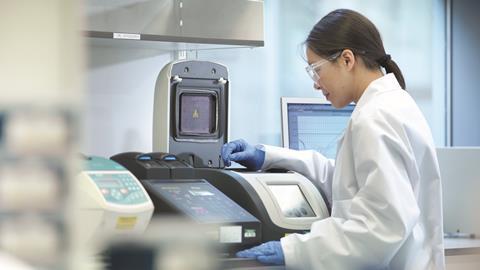Virtual sharing and equipment loans are making access to vital research tools easier
Equipment is so central to research that physics historian Peter Galison ranks tools as a greater driver of scientific revolutions than ideas. Yet that importance can be very frustrating when you can’t afford to buy the tool you need.
Like many scientists, Tobias Wingbermuehle experienced this problem when doing research at the German Sports University in Cologne. Therefore, when his friend Niklas Friedberg came to him with the idea for an online marketplace where equipment owners could offer other scientists access, he immediately saw the potential. Together they founded the London-based platform Clustermarket, which provides access to a community of researchers willing to collaborate in this way.
Clustermarket’s emergence reflects a growing realisation of the need for better access to lab equipment. Renting and sharing lab equipment is far from a new idea. It’s especially common for major manufacturers to allow customers to lease tools, paying regular instalments for three or four years. Usually, the lab using the tool becomes its owner when the lease ends. Leasing can provide access to crucial instruments without needing to lay out hundreds of thousands of pounds up front. However, if you only need to do a day or a month’s worth of experiments, it’s not much help. Similarly, while collaborations between universities are common, setting up contracts granting access to equipment can take several months.
This can delay innovation, stresses the third Clustermarket co-founder, chief executive officer Johannes Solzbach. The company was initially focussed on supporting biotech start-ups, he says, but now increasingly also involves academic labs. ‘Our main motivation is to democratise science, and give every scientist and entrepreneur the chance to validate and commercialise their idea in a quick and easy way. Our goal is to become a one-stop-shop for scientists and engineers. Whenever they need expertise, a piece of technology or facility, they can go on our platform. On top of that, Clustermarket can be used as a booking platform for larger institutions like pharma companies who only wish to share their resources internally with their product teams.’

For academic institutions, Clustermarket is free to use internally, with the company making its income from a 10% commission on inter-institution sharing. Currently, owners charge an average £94 an hour for granting access to external researchers.
In seeking to help such a wide range of people, Clustermarket takes into account the level of support users need in order to operate an instrument successfully. When early-stage start-ups book time on an instrument, they will need technical support from members of the lab it’s located in. Consequently, equipment owners offer access combined with their support through Clustermarket, or a full service where the host lab does all the work.
This combines with user profiles that show levels of experience, and reviews of their past rentals through Clustermarket. ‘Both parties have to review each other, it’s how we ensure quality,’ Solzbach says. Owners can see how well users have looked after the equipment, he explains. Any harm to instruments or users is usually already covered by the hosts’ own insurance in academic institutions, as long as users are adequately trained. Clustermarket is also talking to insurance companies to cover industrial owners, Solzbach says. However, the way Clustermarket ensures support minimises the risk of damage, and so the company doesn’t ‘see an immediate need for it’.
While equipment providers can set up their own contract to cover such eventualities, Clustermarket is working on a standard contract that covers all sharing done on its platform. It has already achieved this with some London universities, with contracts that get people into the lab ‘within a couple of days’ according to Solzbach.
Efficient expenditure
As well as greatly benefiting young scientists who don’t have the access to tools their older colleagues might, Clustermarket also helps owners make the most of their investment. ‘Lab equipment is really underutilised and it’s losing money every day,’ Solzbach says. That’s now driving UK research councils to encourage sharing. ClusterMarket is helping users to find out if they can make their equipment available, although it is not working directly with the research councils. Instead, it’s collaborating informally with Jisc, a not-for-profit organisation that supports digital services and solutions in UK education.
‘We’re currently working to help find out where equipment is, and if scientists need to buy, or could they just rent,’ Solzbach says. ‘On the other hand, grant holders can prove the efficiency [with which instruments are used] to increase the likelihood of receiving a grant in the future. This is all possible through the platform and we’re currently working with Jisc to find out the parameters that the research councils would like to see.’
Martin Hamilton, a futurist at Jisc, notes that its ‘research intensive member institutions’ are keen to ‘operationalise and evidence equipment sharing’. Some universities manage equipment via systems such as Elsevier’s Pure or Symplectic Elements, he explains. This can already link equipment to associated grants, publications and principal investors, which can help understand where to apply for grants and which facilities are critical to high-quality research. Other universities pursue more ‘transactional approaches’ around lab management and booking systems, Hamilton says, such as Academician, Clustermarket, OpenIRIS and ULAB – often replacing low tech approaches like paper ledgers.
Hamilton echoes Solzbach’s assertion that sharing tools can ‘help improve the time-to-science’. ‘Researchers would prefer to do research, not be diverted into bringing in capital funding, going out to procurement, and then often building the necessary lab facilities,’ he stresses. If scientists buy a high-value piece of capital equipment for research, funders will typically stipulate that they should make it available for other people to use, Hamilton adds. ‘This is giving rise to an increasing number of “born shared” facilities, where the sharing is baked into a consortium approach. Why duplicate effort, when you could have one really good one facility that you share with your research partners?’
Yet there are practical and financial barriers to overcome before UK academic institutions can enjoy such benefits. One financial challenge is that the fees charged for sharing can be subject to the UK’s added tax (VAT). While the government has put a VAT cost-sharing exemption in place that’s meant to relieve that burden, in practice it’s hard to meet its requirements. For example, the N8 group of universities in northern England has set up a cost-saving group to share equipment, but found that it still had to pay VAT on charges associated with sharing.
Institutions currently hold information about equipment in a wide range of services and systems. Researchers therefore face a practical challenge in discovering shared equipment and finding out how to access it. To help with this, Jisc has collaborated with the Engineering and Physical Sciences Research Council (EPSRC) and the University of Southampton to develop equipment.data. On this searchable open database, institutions list the equipment that they hold that is available for external use.
‘equipment.data really is a one-stop-shop, holding details of over 12,000 items of equipment from some 50 organisations,’ Hamilton says. ‘Most items listed are worth over £20,000, so at a conservative estimate the site makes the details of around £250 million worth of equipment available to other researchers and also to industry.’
Business critical
While sharing is admirable, Robert Preville, chief executive officer of Kwipped, an online marketplace based in Wilmington, US, is dubious about whether the service level would be adequate for ‘mission critical’ business activities. ‘We do a lot of equipment rental for clinical research,’ he says. ‘A clinical research organisation is not going to rent from us if they have a bad experience that causes their trial to have unpredictable results, or downtime.’

Consequently, Kwipped’s platform aggregates experienced equipment suppliers offering expert maintenance, repairs, training and service for their instruments. It provides short-term rentals on month-by-month, week-by-week or day-by-day terms. ‘That means that on the supplier side we primarily deal with distributors, manufacturers, equipment resellers and brokers,’ Preville says. ‘We’ve actually let suppliers go from the marketplace because they weren’t meeting our expectations of quality.’
Preville founded Kwipped after previously developing an online contract manufacturing marketplace and founding an online electronic test instrument distributor. ‘Customers came to us and said, “We need some expensive equipment that you guys sell, but only short term – would you be willing to rent it?”,’ he recalls. ‘So we quickly built a lucrative line of rentals.’ When he sold his previous company in 2011, he realised that renting equipment wasn’t a well-connected market. An online marketplace therefore ‘drove a lot of efficiency’, Preville explains.
Like Clustermarket, as well as ensuring suppliers are reliable Kwipped also qualifies users’ familiarity level with the equipment and offers training if needed. ‘We get calls saying “My kid is doing a school science project, can I rent an HPLC?” and we’re like “I don’t think our suppliers are going to be comfortable renting to you”,’ Preville says. If users damage equipment, the standard contract every Kwipped user and supplier signs up to is ‘heavily biased towards the supplier to protect them and their equipment and indemnify them from any liability’.
As well as short-term rentals, the company recently launched a streamlined equipment leasing program for longer-term needs. Typically leasing involves equipment manufacturers selling the tool a laboratory needs to a bank, and the laboratory paying the bank in instalments, while using the tool. Kwipped is now partnering with the banks. ‘You come to Kwipped, put in a request for quote for a piece of chemistry or analytical lab equipment,’ Preville explains. ‘You get quotes back from numerous suppliers. If one looks good, you can then apply for a lease, which then goes to the leasing companies. Now you’re dealing with one website where you can identify the equipment and the vendor and get matched up with the right leasing company in a very streamlined, efficient way.’
That’s a great relief for the typical renter, Preville asserts. ‘It’s a scientist, a business owner – their job is to do chemistry, or to facilitate clinical trials,’ he says. ‘It’s not a good use of their time to spend two days on the phone trying to make all this happen. Within minutes they can get their equipment and get on with their job. We sometimes underestimate the amount of work required just to get labs set up. Oftentimes, people don’t view that as part of their job until they have to do it.’













No comments yet